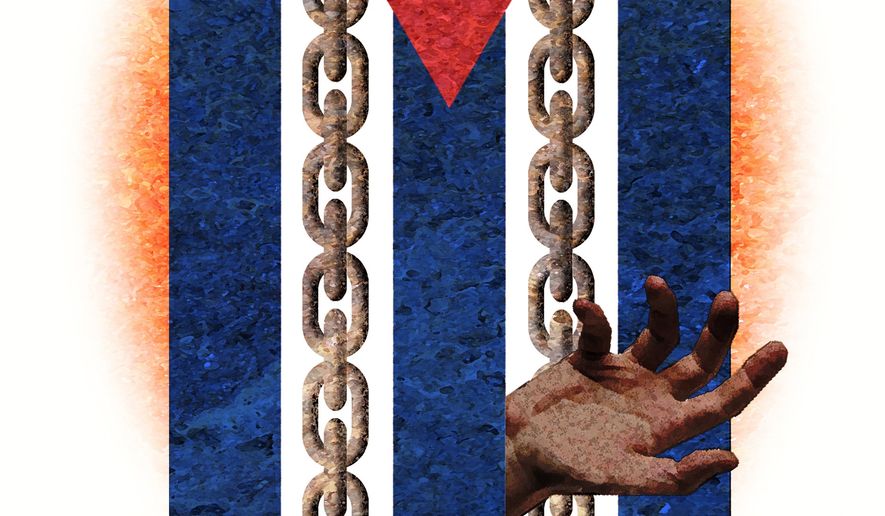OPINION:
Last week, the U.S. Embassy in Havana disrespected the people of our homeland by celebrating Black History Month with the Cuban Ministry of Culture and Cuban Institute of Music, two communist regime agencies responsible for targeting and censoring Black artists and dissidents.
The embassy held a series of concerts and “exchanges” with Cuban audiences, including a performance by American singer-songwriter Tonya Boyd-Cannon.
But make no mistake.
While the State Department dared to call this embarrassing event a “celebration,” it was nothing less than a walk of shame and total disregard for the many Black dissidents in Cuba who are being tortured in Cuban prisons. Since the July 11, 2021 protests, more than a thousand human rights activists languish in Cuba’s penal system.
Ignoring these brutal facts and its purported commitment of human rights, the U.S. Embassy instead posted an ad on social media that read, “if you want to vibrate to the style of American singer-songwriter @TonyaBoydCannon come at 10 p.m.” to celebrate Black History, boasting that “good music is guaranteed.”
Ironically, that post was published on Feb. 23, the anniversary of the death of Orlando Zapata Tamayo, one of Cuba’s most significant Black human rights fighters. He died in prison to the day 13 years ago after an 80-day hunger strike, repeated beatings and degrading conditions.
Even more ironic is the fact that the embassy celebrated Black History Month by collaborating with two communist regime agencies widely known for restricting artistic freedom, censoring Black Cuban artists and targeting dissident rappers.
While many Americans are probably unaware of the regime’s oppression of Black activists, some of the latest crackdowns have actually targeted their community — so much so that in 2020, more than 500 Cubans protested at the front doors of the Ministry of Culture, demanding that the agency stop harassing the San Isidro Movement, or SIM — a blossoming social movement of mostly Afro-Cuban artists, poets and musicians.
The movement took its name from one of Havana’s poorest Black neighborhoods and fiercely opposed Cuba’s proposed Decree 349, a 2018 law that requires Ministry of Culture approval for public and private artistic exhibitions and performances.
Shortly after the regime imprisoned Black rapper Denis Solis after he expressed his admiration for then-President Donald Trump, the SIM launched a 2020 hunger strike to demand his release.
To preempt dissent, the Ministry of Culture promised a dialogue with artists that was never borne out. Instead, the regime unleashed a retaliatory wave of police brutality and character assassination campaigns against Afro-Cubans.
One of the movement’s most heroic leaders — Luis Manuel Otero Alcantara, named one of the most influential people of 2021 by Time magazine, and two-time Grammy winner Mykel Osorbo — are sitting in a maximum-security prison, facing sentences of five and nine years, respectively.
The two Afro-Cuban men have been declared prisoners of conscience by Amnesty International.
Mr. Osorbo won two Grammys while in prison for writing the now worldwide viral song “Patria y vida” (“Fatherland and Life”), which became an anthem during the July 11, 2021 protests. The title cleverly inverted the popular slogan “patria o muerte” (“Fatherland or Death”) imposed by dictator Fidel Castro. Unless he is freed sooner, Mr. Osorbo, whose health is deteriorating, will be 50 years old when he is released.
On several occasions, “Patria y vida’” composer Yotuel Romero had to defend himself from racial slurs hurled by former Minister of Culture Abel Prieto and other regime acolytes who dared to say that “if it wasn’t for Fidel Castro, he would be a Black person cleaning boots.”
According to a 2021 report by Freemuse, an international civil rights index, Cuban rappers are among the most persecuted artists in the world.
Despite these facts, the U.S. Embassy in Havana elected to celebrate Black history with the very institution that has persecuted these two, heroic Black artists turned democracy activists. They also neglected to pay homage to Diubis Laurencio Tejeda, a Black singer who was killed by the Cuban regime one day after the July 11 protests swept the island.
Even more insulting is how ignorant the State Department believes we Cubans really are. After all, when the U.S. Embassy hires celebrity musicians such as Ms. Boyd-Cannon to convince us that our oppressors are engaging in “initiatives against racism and discrimination,” it reveals an unprecedented level of condescension.
While this ludicrous celebration was an apparent attempt to whitewash the evil nature of the Cuban regime and normalize its abuses, it is also a stain for a presidential administration waving the flag of “racial justice.”
To be sure, two years ago Jan. 27, 17 Cuban artists where beaten by Cuban Minister of Culture Alpidio Alonso and Vice Minister Fernando Leon Jacomino.
The artists were targeted for simply demanding that the Ministry of Culture respect artistic freedom and halt harassment of SIM members.
Video captured at the time depicted arbitrary arrests and beatings of artists in front of the Ministry of Culture by Ministry of Interior agents.
These are the stories of just some of the Afro-Cuban freedom fighters writing their own chapters of Black history — not the U.S. Embassy’s pathetic attempt to whitewash Cubans’ struggle with an invitation to “vibrate” and dance with our own repressors and torturers.
If there is any sense of decency left at the State Department, its leaders will apologize to the Cuban people for their stunning lack of sensitivity.
• Gelet Martinez Fragela and Norges Rodriguez are Cuban political refugees living in South Florida. Ms. Fragela is the editor in chief of ADN Cuba, a news site dedicated to exposing human rights violations in Cuba. Mr. Rodriguez is the editor in chief of YucaByte, a news site targeting the intersection between Cuban digital and human rights.




Please read our comment policy before commenting.